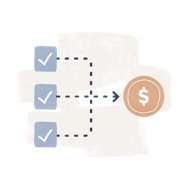Nick Haschka is the CEO of The Wright Gardener, an office plant company headquartered in South San Francisco with about 30 employees. The business serves 11 counties in Northern California by selling, leasing, and servicing interior office plants. The Wright Gardener also provides some exterior plant and corporate floral services. Haschka acquired the business last year. “I didn’t know that this was what I was looking for, but once I found it, I was really excited about it and grew my passion for doing this kind of work,” he said.
Starting Out
Why did you start your business?
I’ve had a bit of a meandering path. I started my career as a management consultant with McKinsey. I was working mostly with Fortune 500 clients in the clean energy and environmental space. I started and sold a solar development company about 10 years ago. I also worked for an energy company called NRG. Since then, I worked with a couple of different startup companies and, most recently, decided to go back to starting up. But, instead of starting a high-growth venture-backed startup, I looked for a business I could purchase and run as a growth company.
I purchased The Wright Gardener with two equity partners last year. The company had been running for 30+ years and the owner was ready to transition to retirement. Over my career, I had been exposed to the facilities space and got more interested in architecture and the interior environment. The mission of the business – to improve the interior work environment – lined up with my interests. Since we purchased The Wright Gardener, we’ve acquired three other similar companies that had been running for more than 30 years with owners ready to transition to retirement.
How did you fund the business when you started?
I had some savings and two other passive partners who contributed some savings. I had a home equity loan that I drew to come up with some cash. And we did a 7a SBA loan as part of the first acquisition. We got another loan from the seller – a note for five years – to further assist in reducing the amount of upfront cash we needed. Day-to-day, we fund the business with the original cash we put in, profits, and an American Express card that we use for month-to-month float without carrying a balance.
Managing the Company
How do you manage cash flow?
We try to keep a cash buffer. Most of the business is recurring revenue contracts billed on the first of the month. Our main expenses are labor and trucks, which we pay for as we go. When we need to make big purchases for a client, we’ll take a deposit upfront for 50 percent. We use QuickBooks to try to keep the books current and to stay on top of the cash position and major payments that need to be made.
What’s the most challenging thing about running the company?
It’s how many balls we need to keep in the air. There are a lot of things going on and you’re constantly shifting gears to focus on what’s most imminent. There’s not a lot of time to focus on the longer-term important things, because you’re easily consumed day-to-day with little things that come up.
What’s the most rewarding thing about running the company?
I love what we do. We’re a service that people want and love. We have, for the most part, very positive interactions every day with our clients. And, I like the diversity of activities that I weigh in on – It keeps my mind agile.
What I’ve Learned
What’s the biggest mistake you made when you were starting out?
We run the business for growth and speed. Sometimes that comes at the expense of thoroughness and correctness with administration and contracting. We’re really focused on getting better at thorough and clear contracting. We need to take the time to explain our terms and conditions to our clients. We need to make sure that they understand things, because it can put us in a difficult position when the client doesn’t understand how we work and the services that we provide. We want to be as client-responsive as we can, but we also need to enforce our terms and conditions.
What’s the smartest thing you did when you were starting out?
The acquisition approach has been really good for us. It fits well with my background and skill set. We put a lot of time and effort into making sure our transitions go well both administratively and from a personnel change management standpoint. Instead of investing heavily in sales and marketing to gain a client base, we’ve invested in our relationships with the other owners.
What advice would you give to a new entrepreneur?
A lot of people think of starting from the ground-up. They don’t think about acquiring an intact business. There’s a lot of good stuff out there and there’s a lot of turnaround right now because the demographics demand it. Once you put the pros and cons out on the table, more people might find it’s easier to buy a company, especially when entering a business you are not well versed in. In our case, we were able to leverage the knowledge of the previous owner and the previous staff to avoid a whole lot of mistakes.
Future Plans
What’s next for The Wright Gardener?
Right now, we’re fine-tuning our Northern California operation. We’re opportunistically making purchases and investments where they make sense. Longer-term, we’re going to start looking to expand to other markets and other geographies.
This article was originally written on September 7, 2018.


Have at it! We'd love to hear from you and encourage a lively discussion among our users. Please help us keep our site clean and protect yourself. Refrain from posting overtly promotional content, and avoid disclosing personal information such as bank account or phone numbers.
Reviews Disclosure: The responses below are not provided or commissioned by the credit card, financing and service companies that appear on this site. Responses have not been reviewed, approved or otherwise endorsed by the credit card, financing and service companies and it is not their responsibility to ensure all posts and/or questions are answered.